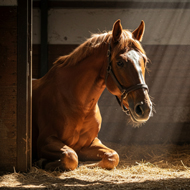Cairn terrier at risk from low birth rate
Just 492 cairn terrier puppies were registered in 2022.
The historic cairn terrier breed could be at risk of disappearing, The Kennel Club has warned, as the number of new puppies being registered is sharply falling.
If the current rate of decline continues, the breed will enter The Kennel Club’s Vulnerable Native Breeds list.
The start of this year has seen a 42 per cent decrease in the number of cairn terrier puppies being registered compared to the first quarter of 2022.
This sharp drop follows a longer-term decline of more than 50 per cent over the past decade. While 1,085 cairn terrier puppies were registered in 2012, just 492 were registered in 2022.
The breed gained international fame in 1939 when Toto, the canine star of The Wizard of Oz, was played by a cairn terrier. The film’s popularity led to a 658 per cent increase in cairn terrier puppies between 1940 and 1947.
The popularity of the breed reached its peak in 1989, with 4,000 new puppies registered, but in recent years, numbers have nosedived.
If the cairn terrier does make it on to the Vulnerable Native Breeds list, it will be joining breeds including the bearded collie, the English setter, and the mastiff.
The list highlights British and Irish breeds which are at risk of disappearing owing to low birth rates.
Bill Lambert, spokesperson for The Kennel Club, said: “The cairn terrier is an iconic breed, best known as Toto, but also as a firm family favourite, so the low numbers we are currently seeing are very worrying.
“Cairn terriers are active and fearless little dogs who make a great pet for the right owners. We have such a rich diversity of dogs in this country, with over 200 different breeds, and we urge would-be owners to make sure they spend time researching to find the right one for them, and are prepared for their various needs, such as grooming, exercise and training requirements.”



 Zoetis UK has called on horse owners to complete a short online survey about their horse's behaviours.
Zoetis UK has called on horse owners to complete a short online survey about their horse's behaviours.